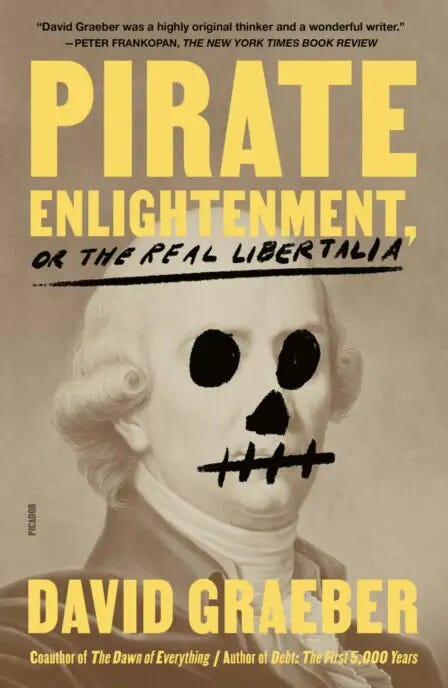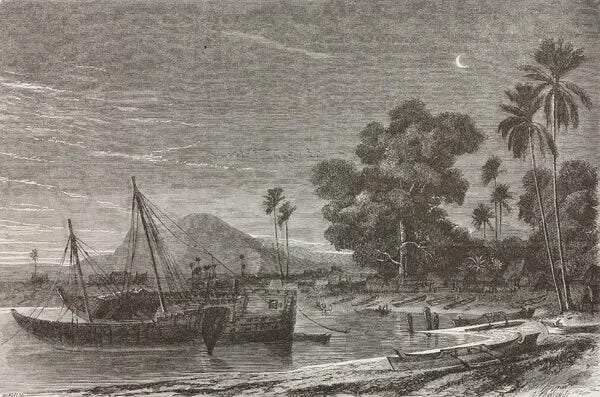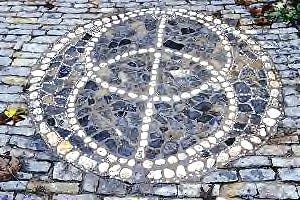Beyond Either/Or: The Forgotten Wisdom of Libertalia
Lessons for Community Builders from the Madagascar Coast of the Seventeenth Century
Our current moment postitions us in the face of twin imperatives: regenerate our living Earth and heal our human divides. Yet we're caught in a maze of false choices. Left or right. Traditional or progressive. Individual or collective. Each day's headlines demand we plant our flag in one camp or another, sorting ourselves and each other into neat boxes that reflect this bifurcated worldview.
But these divisions that feel so solid—that drive our politics, shape our conversations, and fragment our efforts to heal our world—are more like prison walls we've built in our own minds. How can we regenerate a living planet through such a fractured lens? Perhaps our first task isn't to choose sides but to recognize that we've been asking the wrong questions entirely. We must untangle our internal allegiences and reimagine what’s possible.
There's a word for breaking free from this kind of polarized thinking: heterodoxy. It comes from two ancient Greek words - "heteros" meaning "different" and "doxa" meaning "belief." At its heart, heterodoxy is the practice of holding different, even seemingly contradictory ideas together to discover new possibilities. Heterodox thinkers navigate complexity without giving into mainstream narratives of division. It's not about compromising or finding middle ground - it's about transcending the very notion that we must choose between preset options.
This isn't just an abstract philosophy. While re-reading Graeber’s ‘Pirate Enlightenment' this weekend in the mountains, I found myself swept away to the Malagasy Coast of Madagascar during the romantic half-century when pirates and pirate ships experimented with alternative power structures and governance in their own decentralized autonomous zones. You may not know that three hundred years ago, on Madagascar's northeastern shore, an extraordinary experiment in heterodox thinking unfolded. Most people have never heard the stories of Libertalia, a settlement where pirates and local Malagasy people created something unprecedented in human history.

In the depths of our collective memory lies a story that challenges the narratives we've been taught to believe— a story that whispers of different ways of being, of knowing, of relating to power itself. While history paints pirates as merchants of chaos and violence, the truth that emerges from the shadows tells of something far more evolved: communities that understood the delicate dance between individual sovereignty and collective harmony.
The romance of pirate tales colored my childhood imagination, but the historical reality proves even more inspiring. Beyond the "Jolly Roger" mythology lay ships that practiced radical democracy and equal sharing of resources. Graeber's work reveals these weren't just outlaws but pioneers of alternative social organization.
Graeber’s books; "Pirate Enlightenment," "Debt," and "The Dawn of Everything"—challenge our inherited colonial narratives. These weren't just isolated experiments in freedom but evidence that humans have repeatedly created more egalitarian ways of living. At a time when many are sinking into despair about possible futures, these forgotten histories light a path forward. They show us that what we assume to be inevitable about human society is actually a choice.
Aboard these pirate vessels, these seekers of freedom from wildly diverse socioeconomic and ethnic backgrounds discovered what many indigenous and spiritual traditions have long known—that true leadership flows like water, rising to meet the moment and receding when its purpose is fulfilled. Their ships became floating experiments of democratic practice, where captains held power only in moments of urgent necessity, and where the booty of their ventures were shared with an equality that many land-bound societies had forgotten was possible.
These pirate ship experiments were merely the first ripple in a deeper awakening. When these sailors met the shores of Madagascar, something profound stirred in the space between cultures. Here, we find the true revelation not in the much-celebrated tales of pirate democracy or in the ancient wisdom of indigenous ways, but in the sublime alchemy that occurred through Madagascar's women traders—those bridge-builders who could see beyond the illusion of separation.

These women, quite possibly pragmatic optimists as well as keepers of a wisdom that transcended the binary thinking of their time, recognized something that our modern world desperately needs to remember: that apparent opposites are not walls to break through or chasms to bridge, but rather different tones in the same song. They didn't see European and Malagasy traditions as forces to be reconciled, for reconciliation implies a prior separation. Instead, they understood them as distinct expressions of the same human longing for connection, for meaning, for ways of living that honor both individual and collective flourishing. The similarities seemed to be highlighted more than the differences leading to collaboration and altogether new governing structures.
What was not a mere mixing of cultures but a revelation of what becomes possible when we release our attachment to familiar forms. Like master artists working with the palette of human possibility, they painted new ways of being that transcended the limitations of either parent culture. In their creative synthesis, we glimpse a relevant truth: that the most powerful transformations often arise not from the clash of opposites, but from the tender, patient work of those who can hold multiple realities in their hearts without needing to choose between them. Our moment is demanding of us to embody this synthesis today.
In these troubled times, as we find ourselves caught between seemingly irreconcilable ways of seeing and being, the wisdom of these women traders who acted as bridges and cultural architects, calls across the centuries. Their legacy invites us to ask: What new possibilities might emerge if we could approach our differences not as problems to solve, but as colors waiting to be mixed into previously unimagned hues? What healing might unfold if we could learn to hold our certainties more lightly, allowing space for the birth of something that transcends our current understanding?
The children born from these cross-cultural marriages of Malagasy women and pirate men- known as the Zana-Malata - grew up embodying this heterodox wisdom. They weren't caught between two worlds; they were the architects of a new one. Graeber refers to them as “inside outsiders.” Think of them not as hybrid beings torn between identities, but as pioneers who could see possibilities invisible to those trapped in either/or thinking. It was their matriarchal ingenuity that set the stage for what still stands as a “stubbornly egalitarian society resistant to centralized control” called the Betsimisaraka.

The Betsimisaraka Confederation that emerged from this experiment showed what heterodox thinking could achieve in practice. Instead of choosing between European-style voting and traditional Malagasy consensus-building, they created decision-making systems that honored both individual voice and collective wisdom. Their leaders weren't quite chiefs or elected officials - they were something new, holding authority in ways that defied conventional categories.
This experiment on the Malagasy Coast wasn't about finding comfortable compromises. The women traders who shaped these systems understood something profound about power: true strength does not come from choosing between existing options but from creating new possibilities altogether. Their trading networks weren't just about exchanging goods - they were living laboratories for new forms of social organization that made centralized control obsolete. They imagined and executed ways of laundering unimaginable amounts of pirate booty and created an entirely new society as a result of their creativity, inclusion and leadership.
Today, as we grapple with surveillance capitalism, climate crisis, and seemingly unbridgeable political divides, this historical experiment speaks directly to our challenges. When we frame our problems as binary choices - privacy versus security, growth versus sustainability, tradition versus progress - we trap ourselves in the same kind of limited thinking these innovators transcended centuries ago. This challenge is found everywhere— in civilization at large, society, and within communities.
Consider how the Malagasy-pirate communities handled resources. Instead of choosing between private property and communal ownership, they created fluid systems of stewardship that adapted to different needs and situations. Their approach wasn't a compromise between capitalism and communalism - it was something entirely new that emerged from refusing to accept that these were the only options.
The most remarkable thing about their innovations wasn't that they survived colonial attempts to destroy them - it's that many of their core ideas lived on in Malagasy society long after the physical settlements were gone. This teaches us something crucial about heterodox solutions: when we create systems that transcend false dichotomies, they develop a resilience that mere compromise can never achieve—they become “anti-fragile.”
For modern communities facing seemingly impossible choices - between economic growth and environmental protection, between individual freedom and collective security - the Libertalia experiment offers more than historical curiosity. It offers a methodology for innovation: don't choose between apparent opposites; look for the unmarked doors that lead beyond them.
What happens when we apply this heterodox lens to our current crises? Instead of debating whether technology is liberating or oppressing us, we might ask what new forms of human organization become possible when we stop trying to resolve this tension and start working with it creatively. Rather than arguing about centralization versus decentralization, we might explore what emerges when we allow both patterns to inform each other.

The legacy of Libertalia isn't just a story about pirates and traders who dared to think differently. It's an invitation to recognize that our most intractable problems might not be solved by choosing between existing options, but by cultivating the courage to imagine beyond them. In a world increasingly divided by artificial choices, heterodox thinking isn't just an intellectual exercise - it's a vital tool for survival and renewal.
The next time you feel pressed to choose between seemingly irreconcilable options, remember the women traders of Madagascar who saw possibilities where others saw only conflicts. Remember that wisdom often emerges not from resolving contradictions, but from dancing with them skillfully. Perhaps the answers we seek aren't hiding in one camp or another, but in the unexplored territories that open up when we dare to think beyond the boundaries of either/or.
~
The Mandorla Practice: Find two seemingly opposing truths about a situation that deeply troubles you. Draw two overlapping circles, writing one truth in each. Take time to exhaust yourself pleading the case for one before doing the same with the other and repeat. Once entirely exhausted, sit in the mandorla and wait.
The overlap between the circles—the mandorla—is where transformation lives. Like the Madagascar traders who held both European and Malagasy wisdom, sit with both truths simultaneously. Don't try to resolve the tension; instead, allow a third perspective to emerge from the sacred space between. This is how new forms of understanding are born.
Exhaust yourself in pleading the case for Circle 1, then stand in Circle 2 and do the same. Repeat.
Example:
Circle 1: "We need rapid technological innovation to solve our crises"
Circle 2: "We need to return to indigenous wisdom and slower ways of being"
Mandorla space: The emergence of regenerative technologies rooted in ancient understanding of living systems
This is an invitation to practice.
~
And I will leave you with a poem:
by W.B. Yeats
"The Two Trees"
Beloved, gaze in thine own heart,
The holy tree is growing there;
From joy the holy branches start,
And all the trembling flowers they bear.
The changing colours of its fruit
Have dowered the stars with merry light;
The surety of its hidden root
Has planted quiet in the night;
Gaze no more in the bitter glass
The demons, with their subtle guile,
Lift up before us when they pass,
Or only gaze a little while;
For there a fatal image grows
That the stormy night receives,
Roots half hidden under snows,
Broken boughs and blackened leaves.
With Love,
Patrick




